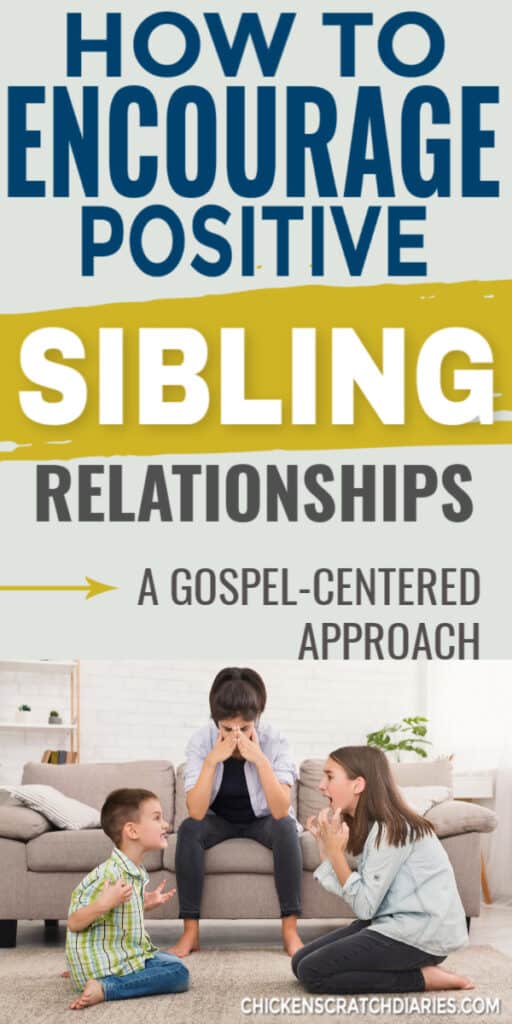
Sibling rivalry is one of any parent’s biggest frustrations, by far. How we view this troubling behavior might matter more than we think.
As moms, we desperately want our our families to be happy and thriving.
Yet with the mix of personalities, opinions and desires all under one roof, conflict between siblings is inevitable.
If you have more than one child, you’re probably no stranger to this problematic behavior either.

This post likely contains affiliate links. Please see our disclosure for more info.
I clearly remember one particular day when my second daughter was a newborn.
My then three-year-old daughter came up to me, sobbing and said:
“I think we should try to get a boy baby instead, mom. She just cries too much….AND I WANT HER TO GO DOWN THE DRAIN IN THE BATHTUB!”
Getting sucked down the bathtub drain was by far the scariest fate she could imagine at the time.
And so, the sibling wars began.
Sibling rivalry: to be expected?
Some would argue that fighting with your siblings is just a normal part of child development.
You probably fought with your siblings and everyone “turned out fine”.
At least, maybe you don’t hate each other anymore.
But I wonder: have we just accepted this part of family life a little too much?
I’ve voiced this in front of other moms and have been met with the skeptical brow more than once.
Is it possible, though, that we could be hindering our children’s relationships (both now and later), by not trying to find real solutions to sibling rivalry and fighting?
What about their spiritual development?
The thing that really makes me realize that the fighting needs to be addressed in my home is the fact that it simply doesn’t please God.
And like any other sin that our kids struggle with, we should be concerned enough to hope to inspire change.
The Bible passage I keep coming back to is in Romans 12.
Verse 10 says we should:
“Show family affection to one another with brotherly love. Outdo one another in showing honor.”
And in verse 18, “If possible, on your part, live at peace with everyone.”

If “family affection” is the standard for how we are to treat non-family, then our love for our family should be the example for how to love everyone else.
Therefore, shouldn’t we set the bar high?
Practical strategies (not a cure-all)
So what’s the best approach to abating sibling fighting and sibling rivalry?
Too often I’ve resorted to the two extremes of over-reacting (yelling at my kids) or ignoring the fighting completely.
Clearly, there are healthier and more effective strategies.
We can’t control our kids’ behavior entirely but we can set up systems that make it more attractive to do the right thing.
And in this training process, they might eventually even want to do the right thing, which is get along with their siblings.
With that said, I honestly don’t believe there’s a magic bullet to make sibling relationships struggle-free.
You won’t find “five easy steps to end sibling rivalry” in this post. (Sorry!)
What I want to do is help the both of us examine what WE can do as parents to set better expectations for how our kids should treat each other.
And, hopefully, make it more likely the rivalry will decrease over time.

1| Fostering healthy versus unhealthy competition
Competition can be healthy and constructive for kids.
Athletics wouldn’t have much a point if not for the urge to compete, right?
It can motivate our kids to work harder and push themselves to excel in many things in life.
The hard work of training for a game or a math competition or even a job interview someday – should all be encouraged.
Sometimes, though, we encourage unhealthy competition between our kids without realizing it.
Some examples:
- Comparing one child’s good grades against another’s
- Expressing disappointment that they didn’t try out for the team like their sibling did
- Making an offhand comment about one child having more in common with you (the parent) with other kids in earshot
Most kids tend to store these comparisons internally and they will find ways to make sure they’re seen and valued in their own right.
We should take care to avoid comparisons in the family setting so that we’re not giving our kids a reason to want to “one up” their brother or sister solely for attention-seeking reasons.
In other words, they shouldn’t feel they have to compete for what they perceive as our “love”.
2| Finding individual time with each child
After you have your second child, you realize how hard it is to duplicate your time and energy.
While there are plenty of ways to spend time together as a family, it can be harder to find one-on-one-time with each child.
Yet, I think it’s one of the biggest keys to decreasing sibling rivalry.
Those targeted interactions can add up to important deposits into your child’s self-esteem bank.
Getting involved in what they’re interested in is one way to show them you care.

Acknowledging our kids as an individual and affirming them as the unique person God created them to be can happen in many ways.
It should be woven into our daily routines but we do have to think intentionally about opportunities for quality time too.
Here’s a list of other ways to spend time with each child and help satisfy that need for feeling special to their mom and dad – even in a big family.
3| Applying appropriate discipline for fighting
Rivalry left unchecked can lead to arguing, fighting and bickering between siblings and it can burden the heart of any parent.
Where do we draw the line, exactly?
To a degree, I’ve tried to stay out of most of my kids’ arguments so that they can learn to work out problems by themselves. This is important, I think.
But when arguing becomes abusive and escalates to intense fighting – physical or otherwise, that’s where I have to step in.
Usually, I’ll send my kids to separate rooms so they can cool off before addressing it further.
Frankly, I don’t like to waste a lot of time trying to figure out who was at fault.
When I’m in the right frame of mind, we’ll talk through the scenario and I’ll ask them how they could do things differently next time.
Related product: Strategies for Defiant Behavior- Ebook and Printables
Flip the script!
Lecturing rarely if ever helps – along with my previous strategy of ignoring or yelling at them to stop.
As authors Amber Lia and Wendy Speake point out, above all: Don’t become another fighter in the ring! It’s simply unfruitful.
In their book, “Parenting Scripts“, they discuss specific “scripts” that we can learn to use when fights erupt.
We can then use that competitive nature to inspire them to be the most kind, the most honorable.
Sometimes we just need new ideas, and this book has many suggestions to help us guide our kids -and ourselves- to respond to conflict in our home with godly wisdom and maturity.
4| Addressing other issues behind sibling rivalry
I think it’s important to remember that with just about ANY negative behavior our kids can muster, there is often (always?) an underlying factor beyond just wanting to drive us nuts.
Yes, we are all sinners and we can’t simply excuse poor behavior, so there will be consequences regardless.
But here are a few common misbehavior-triggers I try to consider:
Lack of sleep
Will an earlier bedtime make this child more cooperative?
This is one of the easiest factors to identify but it does take work to make sure your child is getting enough sleep (going to bed on time and staying in bed.)
Change in routine
Has your child recently started a new school year, just went back to school from a holiday break, moved to a new home, welcomed a new sibling into the family?
Those are the “big upsets” that can really cause disagreeable behavior in any child.
Of course, life is all about change and sometimes it seems once we get a good routine down, circumstances force us to change it all up again.
As much as possible, though, we should try to have consistent routines.
Especially for young kids, in regards to bedtime, meal times, playtime, etc.
Knowing what to expect makes little ones feel more secure and generally happier and more cooperative.
Too much sugar/ poor diet (that day/week)
This is a hard one and for us, poor eating usually goes along with a change in routine.
If I’ve had an overscheduled week, we rely on convenience foods more.
Likewise, if we’re having a fun day out as a family, we’re more likely to indulge in treats.
It’s no joke that kids can fight and bicker the MOST when we’re doing something fun or on vacation!
I’ve always tried to consider that the change in routine (see above) plus the added sugar / less-balanced meals on vacation are part of that problem.

In a typical week though, even swapping out one sugary snack or drink per day for a healthier choice can make a difference in each of my kids’ behaviors.
Making sure they get plenty of water is also important.
Over half of all kids are dehydrated and simply drinking more water can make them feel better and be easier to get along with!
When we know there are one of these triggers in play, it doesn’t necessarily make it easier to END the behavior/fighting right away.
But it can give us more compassion.
It can take the wind out of our angry sails and help us proceed with those calmer responses that we want our kids to see from us.
Also read: The Benefits of Raising Country Kids: 5 Things to Know
The road to brotherly love
As I strive to train my kids to appreciate their siblings, I realize that this mission, like most of parenting, is an ongoing process.
Sibling rivalry literally goes back to the beginning of time with Cain and Able- the first siblings ever born.
I don’t think it’s any coincidence that these brothers were the most extreme example of rivalry-gone-wrong!
We can see how the sin of pride and jealousy can fester in any relationship.
And without repentance it can be incredibly harmful to us and those we should love the most.
That’s where we come in as parents.
Because our kids simply don’t have the maturity to always understand the implications of sin, we have to make them clear.

So the next time we find our kids squaring up for battle, let’s make sure we’re armed with prayer, first and foremost.
And let us allow the Holy Spirit to guide us in wisdom as we take intentional steps to inspiring healthy relationships in our home.
May we be vigilant in helping them to see their siblings not as their enemy, but as God-given, lifelong allies.

Originally published 10/23/19; last updated 6/4/20.
